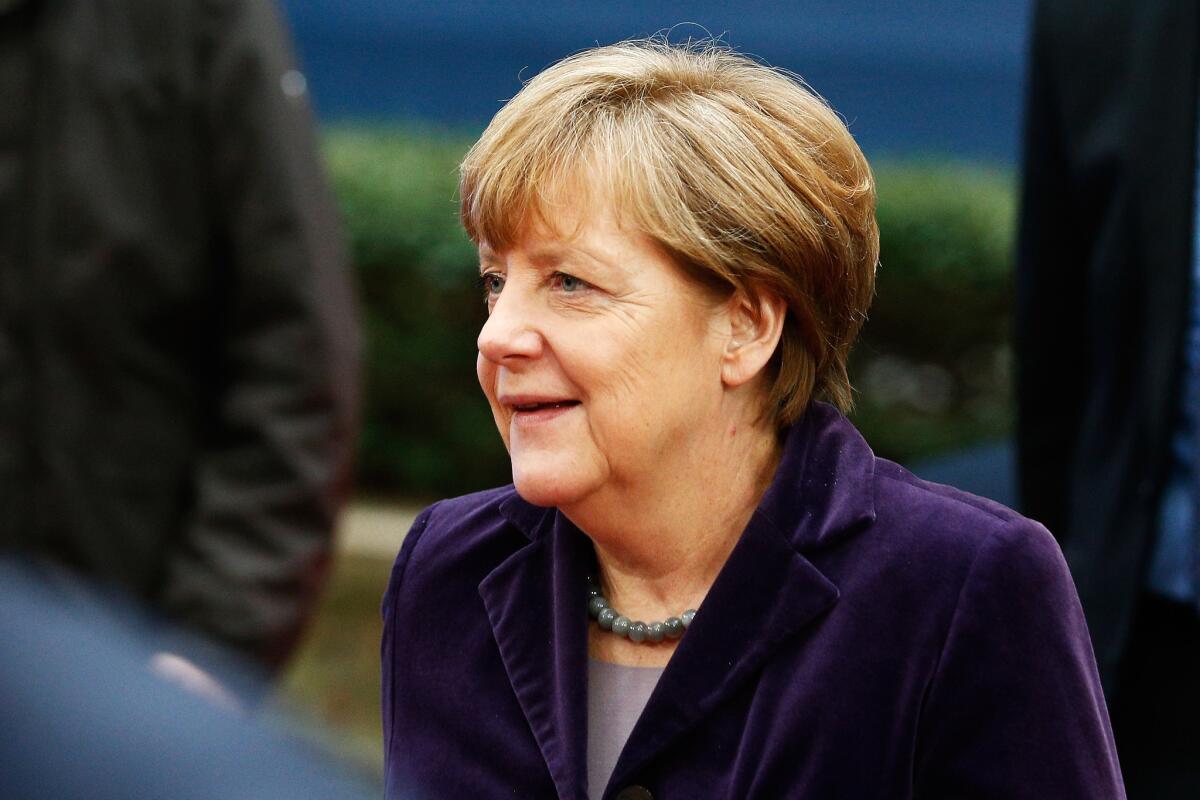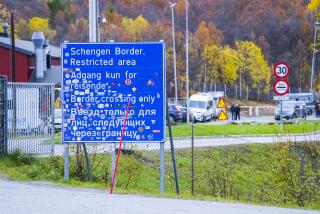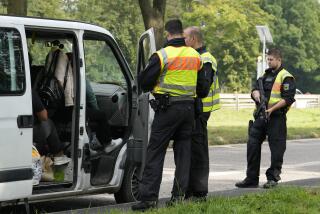EU leaders scramble to save a signature achievement: Passport-free travel

German Chancellor Angela Merkel arrives for European Union meetings in Brussels.
Reporting from Paris â If the arrival of more than 900,000 migrants this year wasnât reason enough for European leaders to want to get a grip on the regionâs external borders, the investigation into last monthâs deadly terrorist attacks in France yielded some unsettling discoveries.
Most, if not all, of the Islamic State militants who killed 130 people in Paris on Nov. 13 were French or Belgian nationals able to slip between European nations and travel to Syria and back without being identified or checked. And at least two managed to infiltrate the wave of Syrians fleeing to Europe to launch the shooting and bombing rampage.
With key suspects still at large, European Union authorities are scrambling to introduce measures to bolster security and save one of the blocâs hallmark achievements: the free movement of citizens across most of its internal borders. But the moves are fraught with controversy, and it is unclear whether they will be approved by member states and the unionâs European Parliament.
EU leaders will have a chance to weigh in on the proposals during a two-day summit that began in Brussels on Thursday and is intended to galvanize member states into action on some of the most pressing issues facing the 28-nation union. Far from pulling together, however, such meetings frequently degenerate into acrimony and produce little progress.
Addressing lawmakers in Berlin on Wednesday, German Chancellor Angela Merkel said Europe had weathered a âturbulent and very difficult year,â one that also saw bankrupt Greece come perilously close to being ejected from the euro currency zone.
âWe have witnessed Europeâs cohesion being put to the test,â Merkel said.
Many countries have set up temporary border controls, which is permitted in an emergency under the rules governing the Schengen Area, a passport-free zone create by a 1985 treaty named for the village in Luxembourg where it was signed.
Those controls include checkpoints instituted by France and Belgium after the attacks and the construction of miles of fences by Austria, Hungary, Slovenia and others to curb the number of asylum seekers flooding their borders. Even Germany and Sweden, which have been by far the most welcoming to the migrants, are taking steps to control the massive flow.
Without better security at the regionâs external frontiers â and more cooperation between intelligence and law enforcement services within them â the fear is that such measures could essentially become permanent, undoing decades of effort to forge closer ties and tighten economic integration through free movement of goods and people.
The most contentious proposal, unveiled by the unionâs executive European Commission on Tuesday, involves the creation of a new border and coast guard agency with the power to step in when countries are unable or unwilling to police Europeâs external borders.
The plan has backing from such European heavyweights as France and Germany, which have been pressing Greece and Italy to apply rules requiring those seeking asylum to register in the country where they first cross into the passport-free zone before they are free to move within it.
But the proposal has revived old fears about a loss of national sovereignty to EU bureaucrats in Brussels.
Join the conversation on Facebook >>
âI would not support a diktat-based takeover of border controls,â Hungaryâs foreign minister, Peter Szijjarto, told reporters this week.
Donald Tusk, president of the European Council, the EU leadership body, said there was no good alternative.
âEurope cannot remain vulnerable when Schengen states are not able to effectively protect their borders,â he said as he headed into Thursdayâs meeting.
European leaders decided to give government ministers until June 30 at the latest to decide whether to pursue the plan, according to a statement released during the meeting.
The focus of their concern is Greece, which is grappling with a crippling economic crisis and has been unable to cope with the hundreds of thousands of migrants from the Middle East and beyond who are streaming into Europe through Greek islands located within sight of Turkey.
Only about 20% are intercepted by Greeceâs overwhelmed border guards, who have largely looked the other way as the migrants continue north in search of better prospects in Germany, Sweden and Austria.
Some officials have gone so far as to suggest that Greece should be kicked out of the Schengen Area, which now includes 22 EU states plus Iceland, Liechtenstein, Norway and Switzerland.
Others have floated the idea of a âmini-Schengenâ zone that would see some Western European countries restore passport checks along their borders, essentially shrinking the free-travel area to its seven original members or fewer.
Greece contends that it is being made a scapegoat for the EUâs sluggish and ad hoc response to the migrant crisis and threats posed by violent extremists. Promised assistance, including more border guards and fingerprinting machines, has been slow to materialize, they complain.
Greek Prime Minister Alexis Tsipras has welcomed proposals to give more resources and powers to the EUâs border agency, Frontex, but only if his country retains ultimate authority to police its borders.
The new agency that the European Commission proposes to build out of Frontex would be able to draw on a permanent reserve of border guards and technical equipment provided by member states, avoiding time-consuming appeals for contributions. This standby-force would be at least 1,500 strong and could be deployed within days in an emergency, even without the consent of the host country.
The EU executive body is also proposing to introduce systematic checks against law enforcement databases for all people entering and exiting the Schengen Area, to determine whether they might be subject to an arrest warrant or in possession of a stolen passport.
To bolster internal security, government ministers have been calling for more intelligence sharing, tougher gun laws, the collection of airline passenger data and a crackdown on the use of prepaid bank cards and other methods used to transfer money anonymously.
Such proposals have been on the table for years, and the French interior minister, Bernard Cazeneuve, has expressed frustration that more wasnât done after the deadly Paris attacks in January against a satirical publication, Charlie Hebdo, and a kosher supermarket.
âItâs all very well having open borders, but you have to be prepared to defend those open borders,â said Judy Dempsey, a nonresident senior associate at Carnegie Europe and editor in chief of Strategic Europe. But she said there isnât a culture of cooperation between the regionâs intelligence and law enforcement services, some of whom do not trust one another.
Regional experts suggest that the recent attacks in Paris, the latest in a series of terrorism plots to take aim at Europe, may have provided the impetus needed to begin to address security deficiencies. The potential cost to business, trade and tourism of a full restoration of Europeâs internal borders are too great to ignore.
But they are far less certain that leaders will be able to agree on a collective approach to tackling the other big threat to greater European unity. The migrant crisis has exposed deep divides between member states and fueled the rise of far-right, populist parties long skeptical of the EU.
Some poorer, Eastern nations have been resisting pressure by Germany and other wealthy Western states for all EU members to share the burden of accommodating refugees. Of the 160,000 refugees that EU members in September agreed to take in to ease pressure on Greece and Italy, about 200 have been relocated, the commission says.
âThe consensus among EU governments that this problem should be addressed on the EU level is not growing,â said Josef Janning, who heads the Berlin office at the European Council on Foreign Relations, a think tank. âRather, it seems that people are digging in with their respective positions. ... That, I think, is the real danger.â
ALSO
U.S. and Russia unite to target Islamic Stateâs revenue sources
San Bernardino shooter was a Pakistani who became known as a âSaudi girlâ
Air Force to allow non-officers to fly drones for first time
More to Read
Sign up for Essential California
The most important California stories and recommendations in your inbox every morning.
You may occasionally receive promotional content from the Los Angeles Times.











